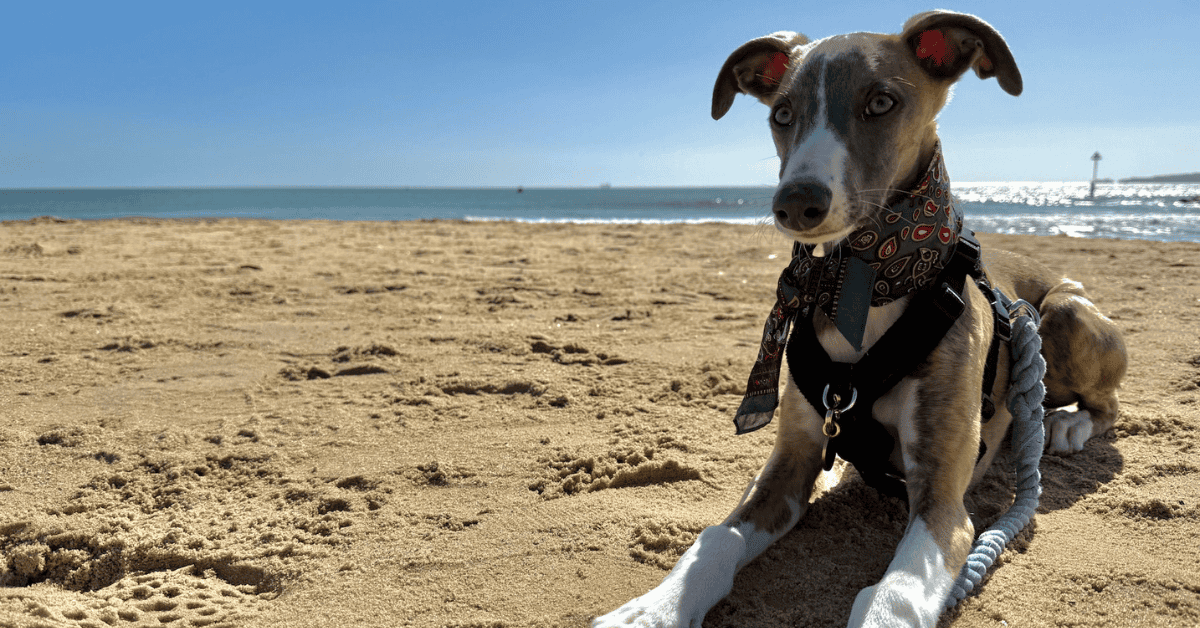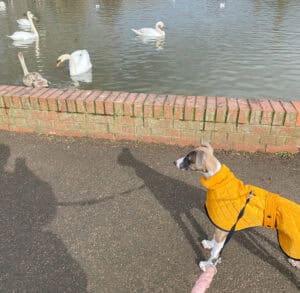
Featuring Merlin the Whippet Puppy!
Written by Becki Gude, BA (Hons) PACT-KSA ABTC-ATI
Why Socialisation Matters
Bringing a new puppy home is an exciting experience for the whole family! But it does come with a big responsibility— socialising your pup in the best way possible to help them grow into a confident, well-adjusted dog. The world is full of unfamiliar sights, sounds and experiences, and good socialisation teaches your puppy how to navigate them without fear. A well-socialised pup is happier, more adaptable, and less likely to develop anxiety or behavioural issues. Studies also suggest that well socialised dogs are more optimistic! Whether it’s meeting new people, encountering other dogs, or adjusting to household noises, early exposure to different situations sets the stage for your puppy to grow into a well adjusted adult dog.

The Critical Period of Socialisation
Between three and sixteen weeks of age, puppies are like little sponges, absorbing everything around them. This is the prime window for socialisation, where positive experiences have a lasting impact. Most puppies go to their new homes at around 8 weeks old, so the first two months of their lives with you are critical to their development.
Puppies exposed to a variety of environments, people, and sounds in a controlled manner during this time tend to grow into confident adults. However, this does not mean that your puppy needs to meet every single dog and person on their walk, it’s the quality of the interactions that are important! On the other hand, a lack of exposure can lead to nervousness or fearfulness later on.
You can also get socialising your puppy before they have completed their course of vaccinations! Carrying your puppy around in your arms or in a sling to observe the world around them can be a game changer in the early days. Ensure they are kept off the ground and away from other dogs to avoid the risk of infectious diseases.
Introducing Your Puppy to New Experiences
If you want your puppy to be a part of your daily life, now is the time to introduce them to those experiences. Whether it’s joining you at the office, commuting by train, relaxing at your favourite café, or even going on weekend hikes, early exposure will help them feel comfortable and confident in these situations.
The key to socialisation is making new experiences fun and positive. Introduce your puppy to a variety of people—kids, seniors, people in hats or sunglasses—so they learn that humans come in all shapes and sizes. Let them walk on different surfaces like grass, pavement, or sand to get them used to new textures. Household sounds like the vacuum, doorbell, or hairdryer should be introduced gradually, with plenty of treats and reassurance. Taking short car rides, visiting pet-friendly stores, or sitting in a park to watch the world go by are great ways to expose your pup to different sights and sounds in a safe and controlled way.

Meeting Other Dogs for the First Time
One of the most common questions we get asked, is how to introduce your puppy to other dogs. This should positive experience for you and your puppy, not a stressful one! Choose a friendly, well-socialised dog for their first meeting and pick a neutral, quiet location like a park or a friend’s garden. Keep both dogs on loose leads and allow them to approach at their own pace. Look for relaxed body language, like wagging tails and play bows. If either dog seems tense or unsure, give them space and try again later. Short, positive interactions will help your puppy build confidence and learn good social skills with other dogs.
Using Positive Reinforcement
Confidence grows with encouragement, and puppies thrive on positive reinforcement. Reward calm and curious behaviour with treats, praise, or playtime to create happy associations with new experiences. If your puppy seems nervous, don’t force them into the situation—let them observe from a distance and approach when they feel ready. Rushing the process or putting too much pressure on them can lead to fear, while patience and rewards build trust and confidence over time.

Ongoing Socialisation
Socialisation isn’t just for puppies—it should continue throughout your dog’s life. Regular outings, whether to a dog-friendly café, a hiking trail, or a friend’s house, help reinforce social skills and prevent anxiety. The more varied and positive experiences your dog has, the more adaptable and well-rounded they’ll be.
Helping your puppy become a well-socialised, confident dog is one of the most rewarding parts of pet ownership. With patience, encouragement, and a little sense of adventure, your pup will learn to navigate the world with ease. So grab some treats, get out there, and enjoy the journey of raising a happy, well-adjusted companion!
